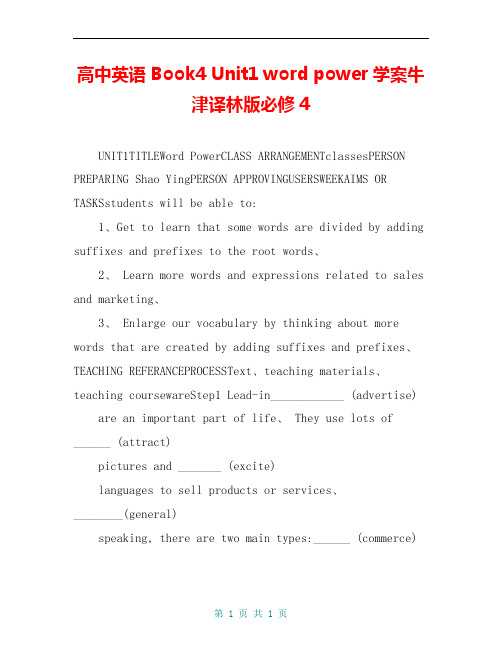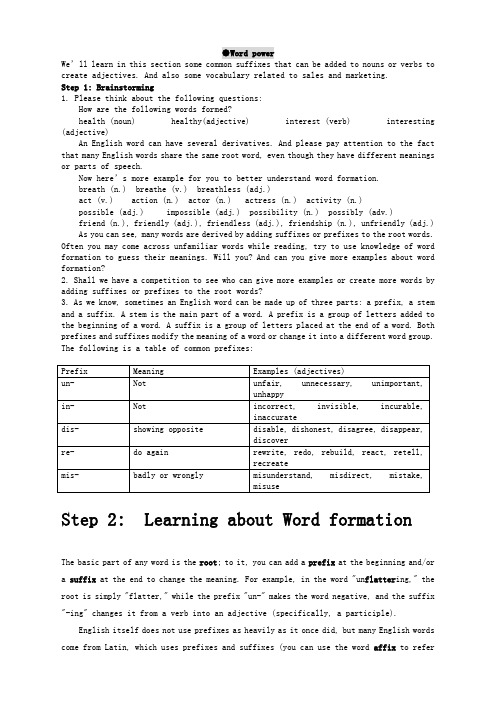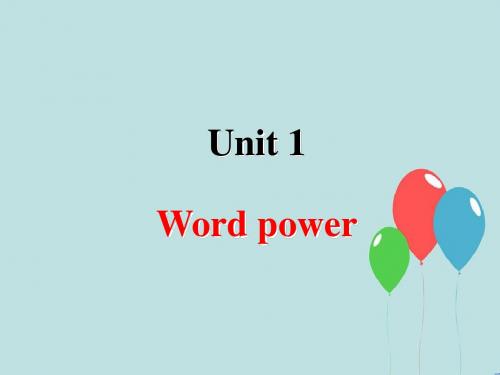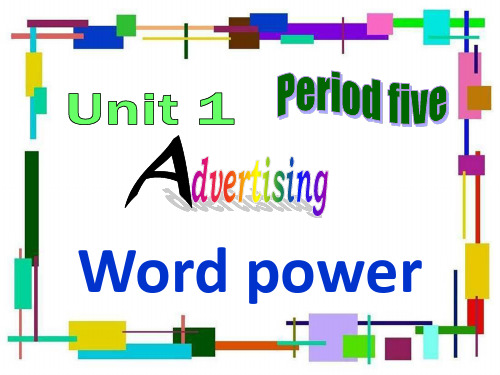最新高中英语-Unit1-Word-power教案-译林牛津版必修4
- 格式:doc
- 大小:163.50 KB
- 文档页数:18

高中英语 Book4 Unit1 word power学案牛津译林版必修4UNIT1TITLEWord PowerCLASS ARRANGEMENTclassesPERSON PREPARING Shao YingPERSON APPROVINGUSERSWEEKAIMS OR TASKSstudents will be able to:1、Get to learn that some words are divided by adding suffixes and prefixes to the root words、2、 Learn more words and expressions related to sales and marketing、3、 Enlarge our vocabulary by thinking about more words that are created by adding suffixes and prefixes、TEACHING REFERANCEPROCESSText、teaching materials、teaching coursewareStep1 Lead-in____________ (advertise) are an important part of life、 They use lots of______ (attract)pictures and _______ (excite)languages to sell products or services、________(general)speaking, there are two main types:______ (commerce)ads and PSAs、 They do not always tell you the_______ (true)、 We should be ________(care)、Step2 Using suffixes①Rootderivatives/new wordshealthinterestdependusedifficultweek②Think more words that are created this way、③SuffixMeaningExamples (adj、)-icalhaving the quality of-ablehaving the quality of-ouslike, full of-fulcharacterized by-lesswithout④ Word Puzzle 用所给单词的形容词形式填空Hidden wordFood and ________ are quite important to our human beings、 ( Fill in the blank with the hidden word、)Step3 Sales and marketingFill in the blanksI want to buy some milk________ from the shop、 ________of milk usually go up during this time、I like ‘Fresh’ milk very much because this band is really u________ 、 Recent sales________show that it is popular among _______、 The shop also gives much _______ of10 per -cent for cash、 Why don’t you have a try?。


●Word powerWe’ll learn in this section some common suffixes that can be added to nouns or verbs to create adjectives. And also some vocabulary related to sales and marketing.Step 1: Brainstorming1. Please think about the following questions:How are the following words formed?health (noun) healthy(adjective) interest (verb) interesting (adjective)An English word can have several derivatives. And please pay attention to the fact that many English words share the same root word, even though they have different meanings or parts of speech.Now here’s more example for you to better understand word formation.breath (n.) breathe (v.) breathless (adj.)act (v.) action (n.) actor (n.) actress (n.) activity (n.)possible (adj.) impossible (adj.) possibility (n.) possibly (adv.)friend (n.), friendly (adj.), friendless (adj.), friendship (n.), unfriendly (adj.) As you can see, many words are derived by adding suffixes or prefixes to the root words. Often you may come across unfamiliar words while reading, try to use knowledge of word formation to guess their meanings. Will you? And can you give more examples about word formation?2. Shall we have a competition to see who can give more examples or create more words by adding suffixes or prefixes to the root words?3. As we know, sometimes an English word can be made up of three parts: a prefix, a stem and a suffix. A stem is the main part of a word. A prefix is a group of letters added to the beginning of a word. A suffix is a group of letters placed at the end of a word. Both prefixes and suffixes modify the meaning of a word or change it into a different word group. The following is a table of common prefixes:Step 2: Learning about Word formationThe basic part of any word is the root; to it, you can add a prefix at the beginning and/or a suffix at the end to change the meaning. For example, in the word "un flatter ing," the root is simply "flatter," while the prefix "un-" makes the word negative, and the suffix "-ing" changes it from a verb into an adjective (specifically, a participle).English itself does not use prefixes as heavily as it once did, but many English words come from Latin, which uses prefixes and suffixes (you can use the word affix to refereither to a prefix or a suffix) quite extensively. For example, the words "prefix," "suffix," and "affix" themselves are all formed from "fix" by the use of prefixes: •"ad" (to) + "fix" (attached) = "affix"•"pre" (before) + "fix" = "prefix"•"sub" (under) + "fix" = "suffix"Note that both the "-d" of "ad" and the "-b" of "sub" change the last letter.Here are some of the most common Latin prefixes (for the meanings of the Latin roots, look up the words in a good dictionary):ab (away) abrupt, absent, absolvead (to) adverb, advertisement, afflictin (not) incapable, indecisive, intolerableinter (between, among) intercept, interdependent, interprovincialintra (within) intramural, intrapersonal, intraprovincialpre (before) prefabricate, preface preferpost (after) postpone, postscript, postwarsub (under) submarine, subscription, suspecttrans (across) transfer, transit, translateStep 3: Ready used materials for Word formationZero MorphemesSome affixes consist of no sounds at all. Zero morphemes DO exist, and we'll see why, and illustrate another concept, allomorphy at the same time.Consider the following words:Adjective Verbyellow yellowbrown browngreen greenpurple purpleThe relation between "yellow" (adjective) and "yellow" (verb) is exactly the same as that between "white" and "whiten", which we just considered. But the form of "yellow" doesn't change. So we say that we added a zero suffix:Verb/ \Adjective -Ø|yellowMeaning: "to make (more) yellow"Zero morphemes are obviously hard to spot because you can't hear them! In these cases you have to notice what ISN'T there. (Sherlock Holmes solves one of his cases by noticing that a dog DIDN'T bark. This was important because there was a situation where any dog would have barked. This is the kind of thinking you have to do to find zero morphemes.)AllomorphyBut now we have two ways to make Adjectives into Verbs meaning "to make (more) Adjective": "-en" ("black-en") and "-Ø" ("yellow-Ø") How do we know which rule to use? That is, why not "yellow-en"?One possible (but uninteresting) answer is that we just have to memorize which affix to use for each stem. That is, we just memorize that "black" takes "-en" and "yellow" takes "-Ø". But we would like a better explanation.As with the phonology problems, the best place to look is "near" where the affix attaches. Since "-en" is a suffix, let's look at the end of the stems. What we find is that we can divide the Adjectives into two classes based on what the last SOUND (NOT letter) of the stem is:•Use "-en" if the last sound is:[p] "deep-en" [f] "stiff-en" [v] "live-en" [t] "white-en"[d] "redd-en" [s] "less-en" [ʃ] "fresh-en" [k] "dark-en"•Use "-Ø" if the last sound is:[e] "gray-Ø" ("His hair grayed (gray-Ø-ed) before he was twenty.")[n] "brown-Ø" [m] "dim-Ø" [l] "purple-Ø" [r] "clear-Ø"We can use the same type of diagrams, and indicate the conditions:Verb/ \Adjective -en if Adjective ends in an obstruent (oral stop or fricative)-Ø if Adjective ends in a sonorant (nasals, approximants, vowels) Meaning: "to make (more) Adjective"When we did phonology problems, we had a notion of "default" or "elsewhere". The same concept can arise in morphology, although in this case the choice is made difficult by the clean cut between obstruents and sonorants. It is true, however, that there are exceptions to this rule with certain unusual adjectives:Verb/ \Adjective -en if Adjective ends in an obstruent (oral stop or fricative)-Ø El sewhereMeaning: "to make (more) Adjective"Another example of allomorphy in English is the choice of the negative prefix "il-/ir-/im-/in-". The rules are:•Use "il-" when the stem begins with "l": "il-legal"•Use "ir-" when the stem begins with "r": "ir-responsible"•Use "im-" when the stem begins with "m, b, p": "im-mobile" "im-balanced", "im-possible"•Otherwise (elsewhere) use "in-": "in-active", etc.In a diagram:Adjective/ \when Adjective begins with l: il- Adjectivewhen Adjective begins with r: ir-when Adjective begins with a bilabial: im-Elsewhere: in-Meaning: "not Adjective"Notice here that there is a clear case that applies when the other (more specific) rules cannot. This is the DEFAULT or ELSEWHERE rule. The ELSEWHERE concept plays an important role in linguistics and we have already encountered it in phonology and we will encounter it again in this course.Finally, some allomorphy is simply exceptional. There are morphemes which are used with only a limited number of words, such as plural "-en" as in "ox-en", "child-(r)en".Furthermore, some words are so irregular that they have no internal analysis, for example "went" is the SUPPLETIVE form for what would otherwise be "go-ed". Children oftenuse words like "go-ed" ("went") or "hold-ed" ("held"). These are called OVERGENERALIZATION errors because the children use a regular productive process on exceptional words.Other ways of Forming Words •Back formationsWhere one "falsely" uses a rule."peddler" refers to a personanalyze "peddler" as "peddle" + "-er"•Blends: "smoke" + "fog" = "smog"; "motor" + "hotel" = "motel"•Words from Names: "jumbo", "sandwich"•Truncation (Clipping): "gym(nasium)", "(tele)phone" Acronyms: "AIDS" = "Acquired Immune Deficiency Syndrome"。



英语必修4译林牛津Unit 1精品教案教材:牛津高中英语(模块四)高一下学期文档内容:教学设计—教案单元:Unit 1 Advertising板块:Word Power课堂设计指导思想:本堂课是以介绍构词法知识为主的词汇教学课。
词汇是语言基础知识的重要组成部分,构词法能帮助学生提高掌握词汇的效率,有助于对学生的基础知识和基本能力的培养。
但需要注意的是,强调基础知识指的是语言知识的灵活运用,而非拘泥于一条条的规则,必须结合具体语境。
教师在语境中教学,学生在语境中学习,语境中运用。
Teaching aims:1. Get to learn that some words are divided by adding suffixes and prefixes to the root words.2. Learn more words and expressions related to sales and marketing.3. Enlarge our vocabulary by thinking about more words that are created by adding suffixes andprefixes.Teaching procedures:Step 1 Lead-in (Blank-filling)Ask students to fill in the blanks with the derivatives of the given words. The short passage is related to the reading passage.【设计说明】用短文填空的方式来导入本课,既可复习上一课的内容,又能快速将学生的注意力引到构词法知识上,即在名词和动词后加上后缀可构成形容词。
Step 2 Show more examplesShow students more examples of derivatives to impress them with the knowledge of word formation.【设计说明】用更多的例子帮助学生加深对构词法知识的印象,并为下一环节做好准备。
Period 4Word powerThe General Idea of This PeriodFirst,get the students to know the definition of suffixes.Then give them some examples and also ask them to give some examples.Next come to the exercises。
In another part,introduce the new words about sales and marketing.And then,more exercises.Teaching Important PointsHow to add correct suffixes to a noun or a verb。
Teaching Difficult PointsTo learn many new words。
Teaching MethodsDo more exercises and give more examples.Teaching AidsA dictionary and a blackboard.Three Dimensional Teaching AimsKnowledge and SkillsHelp the students to know what a suffix is and how to use it。
Help the students to finish the exercises and enlarge the vocabulary. Process and StrategiesGet the students to know the definition of suffixes.Give them some examples and also ask them to give some examples. Do some exercises.Feelings and ValueEnlarge their vocabulary。
英语必修4译林牛津Unit 1精品教案(3)Word●Word powerWe’ll learn in this section some common suffixes that can be added to nouns or verbsto create adjectives. And also some vocabulary related to sales and marketing.Step 1: Brainstorming1. Please think about the following questions:How are the following words formed?health (noun) healthy(adjective) interest (verb) interesting (adjective)An English word can have several derivatives. And please pay attention to thefact that many English words share the same root word, even though they have different meanings or parts of speech.Now here’s more example for you to better understand word formation.breath (n.) breathe (v.) breathless (adj.)act (v.) action (n.) actor (n.) actress (n.) activity (n.)possible (adj.) impossible (adj.) possibility (n.) possibly (adv.)friend (n.), friendly (adj.), friendless (adj.), friendship (n.), unfriendly (adj.)As you can see, many words are derived by adding suffixes or prefixes to the root words. Often you may come across unfamiliar words while reading, try to use knowledgeof word formation to guess their meanings. Will you? And can you give more examplesabout word formation?2. Shall we have a competition to see who can give more examples or create mo re wordsby adding suffixes or prefixes to the root words?3. As we know, sometimes an English word can be made up of three parts: a prefix,a stem and a suffix. A stem is the main part of a word. A prefix is a group of lettersadded to the beginning of a word. A suf fix is a group of letters placed at the endof a word. Both prefixes and suffixes modify the meaning of a word or change it intoa different word group. The following is a table of common prefixes:Prefix Meaning Examples (adjectives)un- Not unfair, unnecessary, unimportant,unhappyin- Not incorrect, invisible, incurable,inaccuratedis- showing opposite disable, dishonest, disagree, disappear,discoverre- do again rewrite, redo, rebuild, react, retel l,recreatemis- badly or wrongly misunderstand, misdirect, mistake,misuseStep 2: Learning about Word formationThe basic part of any word is the root; to it, you can add a prefix at the beginning and/or a suffix at the end to change the meaning. For example, in the word "un flatter ing," the root is simply "flatter," while the prefix "un-" makes the word negative, and the suffix "-ing" changes it from a verb into an adjective (specifically, a participle).English itself does not use prefixes as heavily as it once did, but many English words come from Latin, which uses prefixes and suffixes (you can use the word affixto refer either to a prefix or a suffix) quite extensively. For example, the words "prefix," "suffix," and "affix" themselves are all formed from "fix" by the use of prefixes:•"ad" (to) + "fix" (attached) = "affix"•"pre" (before) + "fix" = "prefix"•"sub" (under) + "fix" = "suffix"Note that both the "-d" of "ad" and the "-b" of "sub" change the last letter.Here are some of the most common Latin prefixes (for the meanings of the Latin roots, look up the words in a good dictionary):ab (away) abrupt, absent, absolvead (to) adverb, advertisement, afflictin (not) incapable, indecisive, intolerableinter (between, among) intercept, interdependent, interp rovincialintra (within) intramural, intrapersonal, intraprovincialpre (before) prefabricate, preface preferpost (after) postpone, postscript, postwarsub (under) submarine, subscription, suspecttrans (across) transfer, transit, translateStep 3: Ready used materials for Word formationAffixesMorphemes added to free forms to make other free forms are called affixes. There are three principle kinds of affixes:1.prefixes (at beginning) — "un-" in "unable"2.suffixes (at end) — "-ed" in "walked"3.circumfixes (at both ends) — "en--en" in "enlighten"(These always seem to consist of otherwise attested independent prefixes and suffixes.)A Rule for Forming some English WordsConsider the following pairs of English words:Adjective V erbdark darkenblack blackenred reddensteep steepenWhat generalization (rule) can we make?•Form: "en"•Combination: At the end of Adjectives (suffix) to make Verbs•Meaning: "to make (more) Adjective"We can draw a diagram to show the internal structure of one of the words:Verb/ \Adjective -en|[blackMeaning: "to make (more) black"Likewise we can draw a partial structure (tree diagram) which shows the three properties of rule of combination for the affix:Verb/ \Adjective -enMeaning: "to make (more) Adjective"Zero MorphemesSome affixes consist of no sounds at all. Zero morphemes DO exist, and we'll see why, and illustrate another concep t, allomorphy at the same time.Consider the following words:Adjective V erbyellow yellowbrown browngreen greenpurple purpleThe relation between "yellow" (adjective) and "yellow" (verb) is exactly the same as that between "white" and "whiten", which we just considered. But the form of "yellow" doesn't change. So we say that we added a zero suffix:Verb/ \Adjective -Ø[|yellowMeaning: "to make (more) yellow"Zero morphemes are obviously hard to spot because you can't hear them! In these cases you have to notice what ISN'T there. (Sherlock Holmes solves one of his cases by noticing that a dog DIDN'T bark. This was important because there was a situation where any dog would have barked. This is the kind of thinking you have to do to find zero morphemes.)AllomorphyBut now we have two ways to make Adjectives into Verbs meaning "to make (more) Adjective": "-en" ("black-en") and "-Ø" ("yellow-Ø") How do we know which rule to use? That is, why not "yellow-en"?One possible (but uninteresting) answer is that we just have to memorize which affix to use for each stem. That is, we just memorize that "black" takes "-en" and "yellow" takes "-Ø". But we would like a better explanation.As with the phonology problems, the best place to look is "near" where the affix attaches. Since "-en" is a suffix, let's look at the end of the stems. What we find is that we can divide the Adjectives into two classes based on what the last SOUND (NOT letter) of the stem is:•Use "-en" if the last sound is:[p] "deep-en" [f] "stiff-en" [v] "live-en" [t] "white-en"[d] "redd-en" [s] "less-en" [ʃ] "fresh-en" [k] "dark-en"•Use "-Ø" if the last sound is:[e] "gray-Ø" ("His hair grayed (gra y-Ø-ed) before he was twenty.")[n] "brown-Ø" [m] "dim-Ø" [l] "purple-Ø" [r] "clear-Ø"We can use the same type of diagrams, and indicate the conditions:Verb/ \Adjective -en if Adjective ends in an obstruent (oral stop or fricative)-Ø if Adjective ends in a sonorant (nasals, approximants, vowels) Meaning: "to make (more) Adjective"When we did phon ology problems, we had a notion of "default" or "elsewhere". The same concept can arise in morphology, although in this case the choice is made difficult by the clean cut between obstruents and sonorants. It is true, however, that there are exceptions to this rule with certain unusual adjectives:Verb/ \Adjective/ \un- Adjective/ \Verb -able|tieMeaning: un( able (tie) ) = "can't be tied"The relative scope of "un-" and "-able" is different in these two cases, leading to a difference in meaning. The difference in meaning also correlates with whether "un-" is modifying a verb or an adjective. When a difference in meaning correlates with a difference in structure like this we call this STRUCTURAL AMBIGUITY. Structural ambiguity is a very important concept. We will see exactly the same thing when we analyze sentences.Other ways of Forming Words•Back formationsWhere one "falsely" uses a rule."peddler" refers to a personanalyze "peddler" as "peddle" + "-er"•Blends: "smoke" + "fog" = "smog"; "motor" + "hotel" = "motel"•Words from Names: "jumbo", "sandwich"•Truncation (Clipping): "gym(nasium)", "(tele)phone"Acronyms: "AIDS" = "Acquired Immune Deficiency Syndrome"课后练习Many of us mistakenly believe that it's wrong to think we have any good qualities. We may spend a lot of time blaming ourselves for our negative qualities, thinking that self criticism is the key to improving our performance. However, a constant focus on our supposed shortcomings can stop our efforts to make friends with other people. How can we believe that others could like us if we believe our inner being is flawed (有缺陷)?If someone seems to dislike you, the reason for that dislike might have little or nothing to do with you. The person who doesn't like you might be fearful, or shallow, or busy or shy. Perhaps you and that person are simply a mismatch for each other at this particular time.Don't take yourself out of the game by deciding that your flaws are bigger than your good qualities. In fact, some of the very qualities you consider to be flaws may be irresistible to someone else. For all the factors that might cause one personto reject you, there are at least as many factors that will work in your favor with someone else.You might be thirty pounds over your ideal weight, but you may have a wonderful laugh and a real enthusiasm for life. There are many people who don’t mind your extra pounds. You may drive a shabby car, but you might be a great dancer and a loyal friend. There are people out there lo oking for loyalty, or fun, or sweetness, or wisdom, and the package it comes in is not important. If you are worried that you are not beautiful enough to attract friends, keep in mind that not everyone is looking for physical beauty in their friends. You can decide to feel inferior(自卑) because you don't have much money and you don't drive a nice car. You can believe that this is the reason that you don't have many friends in your life. On the other hand, if you are very wealthy you may be suspicious that everyone is after your money and that nobody really likes you as a person.The point is that you can focus on just about anything and believe it's the reason you do not have friends and cannot make any.36. According to the author ___________ plays an important role in making friends.A. admitting your shortcomingsB. self criticismC. modestyD. confidence【答案】D【解析】推理判断题。